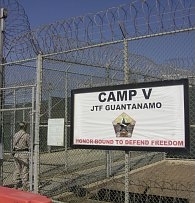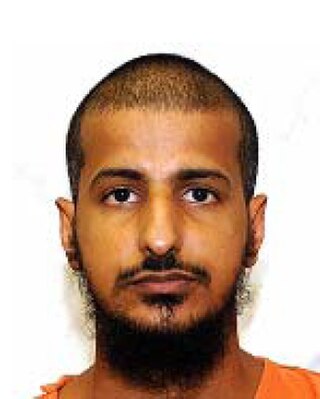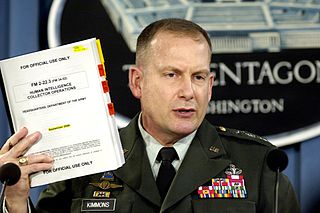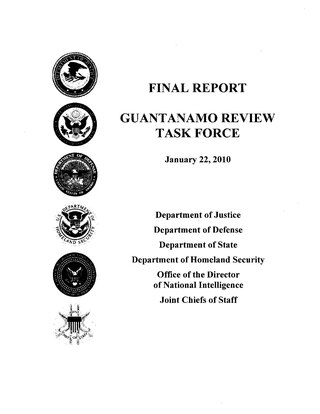
The United States National Security Council (NSC) is the national security council used by the president of the United States for consideration of national security, military, and foreign policy matters. Based in the White House, it is part of the Executive Office of the President of the United States, and composed of senior national security advisors and Cabinet officials.

Abu Faraj al-Libi is an assumed name or nom de guerre of a Libyan alleged to be a senior member of the al-Qaeda terrorist organization. His real name is Mustafa Faraj Muhammad Muhammad Masud al-Jadid al-Uzaybi. He was arrested by Pakistan's Inter-Services Intelligence (ISI) on May 2, 2005, in Mardan. Finding al-Libi was a joint effort of the Central Intelligence Agency's (CIA) Special Activities Division and Pakistan's Special Forces.

The Guantanamo Bay detention camp, also known as GTMO, GITMO, or simply Guantanamo Bay, is a United States military prison within Naval Station Guantanamo Bay (NSGB), on the coast of Guantánamo Bay, Cuba. It was established in January 2002 by U.S. President George W. Bush to hold terrorism suspects and "illegal enemy combatants" during the Global War on Terrorism following the attacks of September 11, 2001. As of January 2025, at least 780 people from 48 countries have been detained at the camp since its creation, of whom 756 had been transferred elsewhere, 9 died in custody, and 15 remain.
Lotfi Bin Ali, also known as Abdullah Bin Ali al-Lutfi, was a Tunisian whom the United States held in extrajudicial detention for over thirteen years in the Guantanamo Bay detention camps, in Cuba. He was one of five men transferred to Kazakhstan in 2014. He was extensively quoted following the death, purportedly from lack of medical care, of one of the other captives transferred to Kazakhstan. In a September 2016 profile in The Guardian, he described exile in Kazakhstan as being very isolating, and, in some ways, almost as bad as Guantanamo.

Daniel Fried is an American diplomat who served as assistant secretary of state for European and Eurasian affairs from 2005 to 2009 and United States ambassador to Poland from 1997 to 2000. He also served as special envoy for Guantanamo closure and co-ordinator for United States embargoes. Fried retired from the State Department in February 2017 after forty years of service.

Tarek Ali Abdullah Ahmed Baada is a citizen of Yemen, who was formerly held in extrajudicial detention in the United States Guantanamo Bay detainment camps, in Cuba. His detainee ID number is 178. Joint Task Force Guantanamo counter-terrorism analysts estimated that Baada was born in 1978 in Shebwa, Yemen.

Muhammed Murdi Issa Al Zahrani is a citizen of Saudi Arabia who was held in the United States's Guantanamo Bay detention camps, in Cuba from August 5, 2002, until November 22, 2014. His Guantanamo Internment Serial Number was 713. Joint Task Force Guantanamo counter-terrorism analysts estimate he was born in 1969, in Taif, Saudi Arabia.
Melissa Hathaway is a leading expert in cyberspace policy and cybersecurity. She served under two U.S. presidential administrations from 2007 to 2009, including more than 8 months at the White House, spearheading the Cyberspace Policy Review for President Barack Obama after leading the Comprehensive National Cybersecurity Initiative (CNCI) for President George W. Bush. She is President of Hathaway Global Strategies LLC, a Senior Fellow and member of the Board of Regents at Potomac Institute for Policy Studies, a Distinguished Fellow at the Centre for International Governance Innovation in Canada, and a non-resident Research Fellow at the Kosciuszko Institute in Poland. She was previously a Senior Adviser at Harvard Kennedy School's Belfer Center.

Army Field Manual 2 22.3, or FM 2-22.3, Human Intelligence Collector Operations, was issued by the Department of the Army on September 6, 2006. The manual gives instructions on a range of issues, such as the structure, planning and management of human intelligence operations, the debriefing of soldiers, and the analysis of known relationships and map data. The largest and most newsworthy section of the document details procedures for the screening and interrogation of prisoners of war and unlawful combatants.

Matthew Glen Olsen is an American attorney who had served as the Assistant Attorney General for the National Security Division. He is the former director of the National Counterterrorism Center.

The Guantanamo Review Task Force was created by Executive Order 13492 issued by President of the United States Barack Obama on January 22, 2009, his second full day in office. United States Attorney General Eric Holder announced Matthew G. Olsen as Executive Director of the task force on February 20, 2009. The task force was charged with determining which Guantánamo detainees can be transferred (released), which can be prosecuted for crimes they may have committed, and, if neither of those is possible, recommending other lawful means for disposition of the detainees.

Executive Order 13492, titled Review and Disposition of Individuals Detained at the Guantánamo Bay Naval Base and Closure of Detention Facilities, is an Executive Order that was signed by United States President Barack Obama on 22 January 2009, ordering the closure of the Guantanamo Bay detention camp in Cuba. This was signed at the same time as Executive Order 13493, in which Obama ordered the identification of alternative venues for the detainees.

Muktar Yahya Najee Al Warafi is a citizen of Yemen who was held in extrajudicial detention in the United States Guantanamo Bay detainment camps in Cuba. The Department of Defense estimate that Al Warafi was born in 1974, in Ta'iz, Yemen.
Executive Order 13567 was signed by President Barack Obama on March 7, 2011. Entitled "Periodic Review of Individuals Detained at Guantánamo Bay Naval Station Pursuant to the Authorization for Use of Military Force", its purpose was to establish a process for review of the cases for all detainees at Guantanamo Bay detention camp to establish whether their continued detention is "necessary to protect against a significant threat to the security of the United States", and make recommendations for transfer if not.
The Periodic Review Secretariat is a body authorized by President Barack Obama in Executive Order 13567, on March 7, 2011. The Secretariat oversees Periodic Review Boards. The Boards convene hearings to make recommendations about selected individuals held in extrajudicial detention in the United States Guantanamo Bay detention camps, in Cuba.
The Periodic Review Boards administrate a US "administrative procedure" for recommending whether certain individuals held in the Guantanamo Bay detention camps, in Cuba are safe to release or transfer, or whether they should continue to be held without charge. The boards are authorized by and overseen by the Periodic Review Secretariat, which President Barack Obama set up with Executive Order 13567 on March 7, 2011.

Paul Lewis is an American lawyer and diplomat. Lewis served as Marine JAG officer and chief counsel to House Armed Services Committee, before President Obama appointed him as Special Envoy for Guantanamo Bay facility closure.
The Atrocities Prevention Board (APB) is an interagency committee consisting of U.S. officials from the National Security Council, the Departments of State, Defense, Justice, and Treasury, the U.S. Agency for International Development, and the U.S. Intelligence Community. The board meets monthly to assess the long-term risks of atrocities around the world.

The White House Office of Domestic Climate Policy is an office within the White House Office that is part of the Executive Office of the President of the United States. It is headed by the Assistant to the President and National Climate Advisor, which is president's chief advisor on domestic climate change policy. In addition, the National Climate Advisor serves as vice-chair of the National Climate Task Force.












